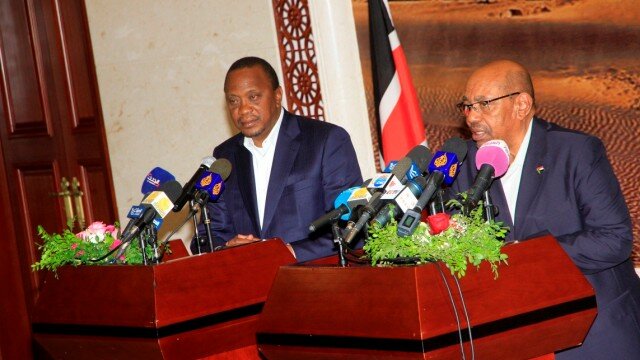
Khartoum (SUNA) - The visit of President Uhuru Kenyatta of Kenya to Sudan is significant as it is seen within the context of the distinguished relations
that link the two countries in various domains.
Ambassador Mohamed Issa Ismail, Director of Africa Department at the Ministry of Foreign Affairs, explained that Sudan was one of the first African countries to officially recognize Kenya's independence and to establish diplomatic representation with Nairobi back in 1964.
Ambassador Ismail said relations between the two countries since then have been stable and the two sides have been cooperating, particularly during the 1970s' shortly after the signing of the Addis Ababa Peace Accord signed in 1972, aimed to end the armed conflict in South Sudan. This period saw the conclusion of a number of cooperation agreements between the two countries, he said, adding that it was at this time the joint ministerial committee was established.
This committee, the ambassador said, held its nineteenth meeting in Khartoum, December 2015 and is expected to hold a similar encounter in a few months in Nairobi.
He further referred to the numerous meetings and encounters between the Sudanese Minister for Foreign Relations Professor Ibrahim Ghandour and his Kenyan counterpart Syada Amina, during their participation in various regional and international activities and meetings.
Ismail has stressed that the current visit of President Uhuru to Sudan would be a chance for the two leaderships to exchange views, ideas and to invigorate the role of the two countries in their endeavors to contribute in the resolution of conflict and disputes in the region, particularly in South Sudan, Burundi, Congo and Central African Republic.
He added that during the visit it is also expected that the two sides would underline the need for mutual support and backing in the regional and international arenas in a way that would be beneficial to the two peoples and countries.
He added that the two sides would also be expected to talks about the most recent development on the so called International Criminal Court and the decision of some African countries to pull out of that body.
He also said the meeting is due to discuss the coercive unilateral sanctions imposed on Sudan and on some African countries and how efforts could be coordinated among those countries to stave off these measures and work on their abrogation.
It is to be noted that there are some 350 to 400 Sudanese national in Kenya, after the separation of South Sudan from the Sudan in 2011, and there is a huge Kenyan community in Khartoum, mainly students at International University of Africa and Ahfad University.
The ambassador said given the depth of the relations between the two countries the visit is expected to yield positive results that would develop the joint interests of the two countries.
Kenya stands out for its strategic position within the Horn of Africa region, as it sits on the main outlet to the eastern and central African regions and as the gateway to the Indian Ocean for a number of countries that are landlocked in the region.
Kenya prides itself as one of the main tourist attractions in the region, thus enjoying a big foreign presence within its borders.
It is furthermore the seat for a number of UN organizations, including the United Nations Environmental Programme (UNEP), the UN Habitat Programme, not to speak about its various memberships and the fact that it is a founding member of many regional organizations such as the East African Group. Sudan and Kenya share membership in the main African and regional organizations, including the African Union, COMESA, IGAD, and the Great Lakes Conference, the Treaty of Ban of Proliferation of Small Area, Cooperation on Combating Human Trafficking in East Africa as well as membership in the East African Football Association SECAFA.
-
Partnering Against Violent Extremism – “PAVE”: A Curtain RaiserNext >

